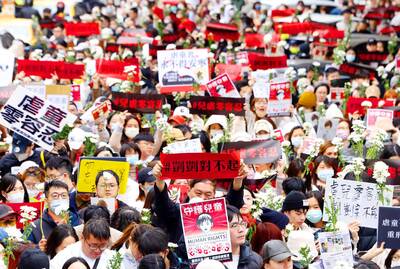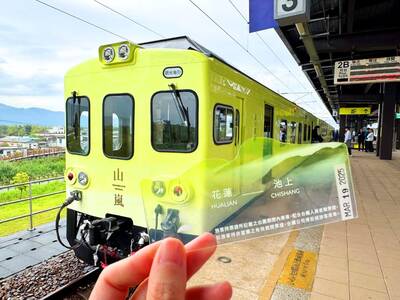Chinese Nationalist Party (KMT) Central Policy Committee director Alex Tsai (蔡正元) yesterday announced that the party’s chairperson election would be moved to May 20 in order to conform with the party charter.
Tsai made the announcement after a working conference at KMT headquarters yesterday, during which the schedule for the election of four types of KMT officials and a plan to end the party’s Huang Fu-hsing (黃復興) military veterans’ branch’s separate election of party representatives were passed.
Both of the proposals are to be referred to the KMT Central Standing Committee for approval tomorrow.
According to the KMT’s preliminary schedule, the chairperson and representative elections are scheduled for May 20 next year, followed by the KMT’s Central Committee and the Central Standing Committee elections on July 8 and July 29 respectively.
Elected officials are set to be sworn in on Aug. 20 next year at a KMT national congress, Tsai said.
Tsai said the decision to move next year’s party chairperson election forward by two months is in accord with Article 17 of the KMT party charter that stipulates a chairperson election should be held three months before a national congress planned for the year the current post-holder’s term is to expire.
“In 2005, a chairperson election was held on July 16 and the winner was inaugurated at a national congress on Aug. 19, which ran against the party charter. While elections in 2013 conformed with the party charter, because the winner in the July 20 chairperson race was sworn in at a national congress on Nov. 10, the previous post-holder occupied the position longer than the statutory four years,” Tsai said.
Tsai said as the term for the first directly elected KMT chairman, Lien Chan (連戰), expired on Aug. 19, 2005, the inauguration date for the successor of KMT Chairwoman Hung Hsiu-chu (洪秀柱) ought to take place on Aug. 20 and the election for the position should therefore be May 20.
Hung was elected party chairwoman on Mar. 26 to serve the remaining term of sixth KMT chairman, Ma Ying-jeou (馬英九), who won re-election on July 20, 2013 before stepping down on Dec. 3, 2014, to take political responsibility for the KMT’s dramatic defeat in the nine-in-one local elections that year.
Ma was succeeded by New Taipei City Mayor Eric Chu (朱立倫) on Jan. 19 last year, who resigned a year later on Jan. 16 after losing the presidential race to the Democratic Progressive Party’s (DPP) Tsai Ing-wen (蔡英文).
As for what he called “a major election reform” involving the KMT’s pro-China Huang Fu-hsing branch, Alex Tsai said in the past, the branch was allowed to elect a certain number of party representatives in a separate election, which resulted in an unequal value of each vote cast by party members.
“From now on, the number of party representatives traditionally elected by the branch will be combined with that chosen by party members,” Alex Tsai said.
According to a source close to the KMT, who requested anonymity, the KMT has 1,147 party representatives, 102 of whom are elected by the military branch’s about 190,000 members.
Additional reporting by Lin Liang-sheng

Taiwan yesterday condemned the recent increase in Chinese coast guard-escorted fishing vessels operating illegally in waters around the Pratas Islands (Dongsha Islands, 東沙群島) in the South China Sea. Unusually large groupings of Chinese fishing vessels began to appear around the islands on Feb. 15, when at least six motherships and 29 smaller boats were sighted, the Coast Guard Administration (CGA) said in a news release. While CGA vessels were dispatched to expel the Chinese boats, Chinese coast guard ships trespassed into Taiwan’s restricted waters and unsuccessfully attempted to interfere, the CGA said. Due to the provocation, the CGA initiated an operation to increase

A crowd of over 200 people gathered outside the Taipei District Court as two sisters indicted for abusing a 1-year-old boy to death attended a preliminary hearing in the case yesterday afternoon. The crowd held up signs and chanted slogans calling for aggravated penalties in child abuse cases and asking for no bail and “capital punishment.” They also held white flowers in memory of the boy, nicknamed Kai Kai (剴剴), who was allegedly tortured to death by the sisters in December 2023. The boy died four months after being placed in full-time foster care with the

CHANGING LANDSCAPE: Many of the part-time programs for educators were no longer needed, as many teachers obtain a graduate degree before joining the workforce, experts said Taiwanese universities this year canceled 86 programs, Ministry of Education data showed, with educators attributing the closures to the nation’s low birthrate as well as shifting trends. Fifty-three of the shuttered programs were part-time postgraduate degree programs, about 62 percent of the total, the most in the past five years, the data showed. National Taiwan Normal University (NTNU) discontinued the most part-time master’s programs, at 16: chemistry, life science, earth science, physics, fine arts, music, special education, health promotion and health education, educational psychology and counseling, education, design, Chinese as a second language, library and information sciences, mechatronics engineering, history, physical education

The Shanlan Express (山嵐號), or “Mountain Mist Express,” is scheduled to launch on April 19 as part of the centennial celebration of the inauguration of the Taitung Line. The tourism express train was renovated from the Taiwan Railway Corp’s EMU500 commuter trains. It has four carriages and a seating capacity of 60 passengers. Lion Travel is arranging railway tours for the express service. Several news outlets were invited to experience the pilot tour on the new express train service, which is to operate between Hualien Railway Station and Chihshang (池上) Railway Station in Taitung County. It would also be the first tourism service